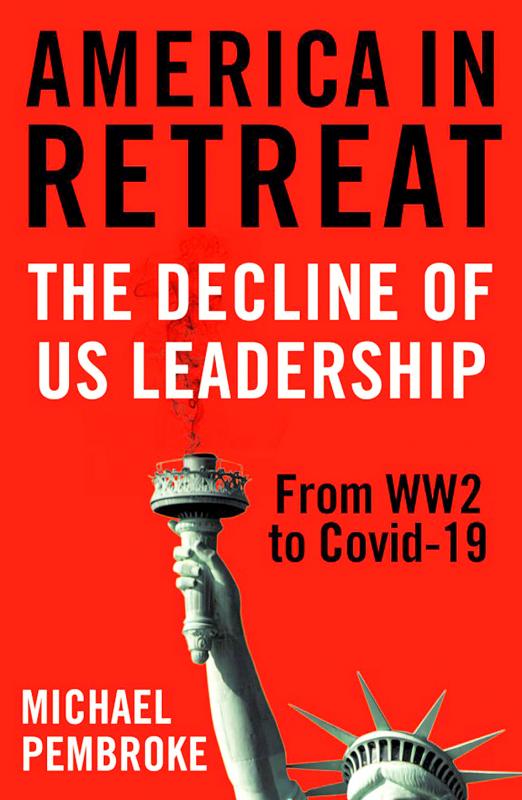After the riot at the Capitol on Jan. 6, embarrassed American politicians lined up to declare: “This is not who we are.” Having read Michael Pembroke’s account of the country’s international thuggery in the last 70 years I’m inclined to reply: “Sorry, no, this is what you always were — loutish, lawless and violent by default.” Pembroke, an Australian jurist and an avowed conservative, quotes a Trump adviser who unforgettably sums up the arrogance of Washington policymakers. “We’re America, bitch,” snarls this unidentified apparatchik; lesser nations can just suck it up.
The British, wanting to look aristocratically nonchalant, claimed they acquired their empire in a fit of absent-mindedness. Americans hid their scheming behind sanctimonious cant about freedom and human rights: they dreamed up the UN but have consistently flouted its principles, no longer even pay it their annual dues and carry on regardless with their godly mission to Americanize the rest of the world, by force if necessary. During the Cold War, the Pentagon invoked a spurious communist menace to justify its exorbitant budget, amassing deluxe weaponry that existed mainly for show. There was no military need to atomize Hiroshima and Nagasaki, since the Japanese were edging towards surrender; the bombs were dropped, as one of President Truman’s cronies suggested, because the apocalyptic display would “make Russia more manageable in Europe.”
Resistance to communism excused American ventures whose actual purpose was to lubricate commerce. A coup was engineered in Iran in 1953 to protect the Anglo-Iranian Oil Company; the CIA hired uncommitted local people to pose as Bolshevik agitators and, when the shouting stopped, American companies snapped up the oil assets. In 1954 in Guatemala, a democratic government was overthrown because its labor reforms impeded the United Fruit Company’s shipments of bananas. This time, the CIA wrote sermons for priests, who obligingly decried communism as Satan’s work. Today, the ideological label remains, used as an inanely automatic slur. Warming up the mob on Jan. 6, Donald Trump Jr referred to the new senators from Georgia — a Jewish investigative journalist and a black pastor with a doctorate in theology — as “commie bastards;” Ashli Babbitt, who got herself killed while battering the doors of the House of Representatives, had previously tweeted that coronavirus curfews were “commie bullshit.”

Truman confused diplomacy with pugilism: he boasted of having given the Soviet foreign minister Molotov a “straight one-two to the jaw” and dismissed liberal critics as “parlor pinks and soprano-voiced men.” But as Pembroke argues, America’s bully-boy tactics have only served to invigorate the country’s foes. The consequences of the disastrous 1953 coup in Iran “are still playing out today,” while the heavy-handed deployment of NATO troops in eastern Europe “explains, at least in part, Russia’s annexation of the Crimean peninsula in 2014.”
Undeterred by Trump’s sanctions, China is building a monorail in Mecca, cement factories in Iraq and a new industrial zone in Suez, laying fiber optic cables in Afghanistan, equipping African ports with defenses against piracy, establishing windfarms in Brazil, renovating the Portuguese electricity grid and buying up English football teams. The west has enjoyed global dominance for the past two centuries, but China was richer and more culturally advanced for millennia before that, and it soon will be so again. Pembroke proves his point by tabulating “Chinese inventions and discoveries in the centuries before Christ,” a list that extends from acupuncture and ball bearings to spindle wheels and vinegar. America’s bluster, he concludes, covers its quaking fear of decline.
In his novel The Quiet American, Graham Greene mocks a CIA agent in Saigon as an innocent abroad and blames the damage done by this wide-eyed simpleton on muddle, not malice. That judgment was surely too kind. One of Pembroke’s spiciest quotes comes from Mike Pompeo, fondly reminiscing at a Texas college about his time as Trump’s CIA director. “We lied, we cheated, we stole,” he chuckles. “It reminds you of the glory of the American experiment.”
Yet the same smug, plump Pompeo, looking back at his achievements as secretary of state, smarmed in a recent tweet that “being the greatest country on Earth is not just about our incredible economy and our strong military; it’s about the values we project out into the world. I believe in America, and American goodness.”
At least Trump never bothers about projecting values, because all that matters to him is projecting his image and monetizing his self-love. That perhaps makes him the epitome of American evil: the devil annihilates every value that doesn’t feed the greedy ego.
Current events have added a startling and acidly ironic epilogue to Pembroke’s narrative. The storming of the Capitol was Trump’s Bay of Pigs, his My Lai, his Iranian hostage crisis and his Benghazi, all compressed into a few ugly hours. True to his “America first” agenda, in declaring war he dispensed with foreign enemies and instead dispatched his followers — the devoted deplorables whom he sneers at as “low-class” — to trash the citadel of his own government. Twisting Pembroke’s thesis askew, this was not a retreat but a self-defeating, self-defaming rout. Trump, we can now see, is America’s revenge on itself.

Last week Joseph Nye, the well-known China scholar, wrote on the Australian Strategic Policy Institute’s website about how war over Taiwan might be averted. He noted that years ago he was on a team that met with then-president Chen Shui-bian (陳水扁), “whose previous ‘unofficial’ visit to the US had caused a crisis in which China fired missiles into the sea and the US deployed carriers off the coast of Taiwan.” Yes, that’s right, mighty Chen caused that crisis all by himself. Neither the US nor the People’s Republic of China (PRC) exercised any agency. Nye then nostalgically invoked the comical specter

April 15 to April 21 Yang Kui (楊逵) was horrified as he drove past trucks, oxcarts and trolleys loaded with coffins on his way to Tuntzechiao (屯子腳), which he heard had been completely destroyed. The friend he came to check on was safe, but most residents were suffering in the town hit the hardest by the 7.1-magnitude Hsinchu-Taichung Earthquake on April 21, 1935. It remains the deadliest in Taiwan’s recorded history, claiming around 3,300 lives and injuring nearly 12,000. The disaster completely flattened roughly 18,000 houses and damaged countless more. The social activist and

Over the course of former President Ma Ying-jeou’s (馬英九) 11-day trip to China that included a meeting with Chinese Communist Party (CCP) leader Xi Jinping (習近平) a surprising number of people commented that the former president was now “irrelevant.” Upon reflection, it became apparent that these comments were coming from pro-Taiwan, pan-green supporters and they were expressing what they hoped was the case, rather than the reality. Ma’s ideology is so pro-China (read: deep blue) and controversial that many in his own Chinese Nationalist Party (KMT) hope he retires quickly, or at least refrains from speaking on some subjects. Regardless

Approaching her mid-30s, Xiong Yidan reckons that most of her friends are on to their second or even third babies. But Xiong has more than a dozen. There is Lucky, the street dog from Bangkok who jumped into a taxi with her and never left. There is Sophie and Ben, sibling geese, who honk from morning to night. Boop and Pan, both goats, are romantically involved. Dumpling the hedgehog enjoys a belly rub from time to time. The list goes on. Xiong nurtures her brood from her 8,000 square meter farm in Chiang Dao, a mountainous district in northern Thailand’s